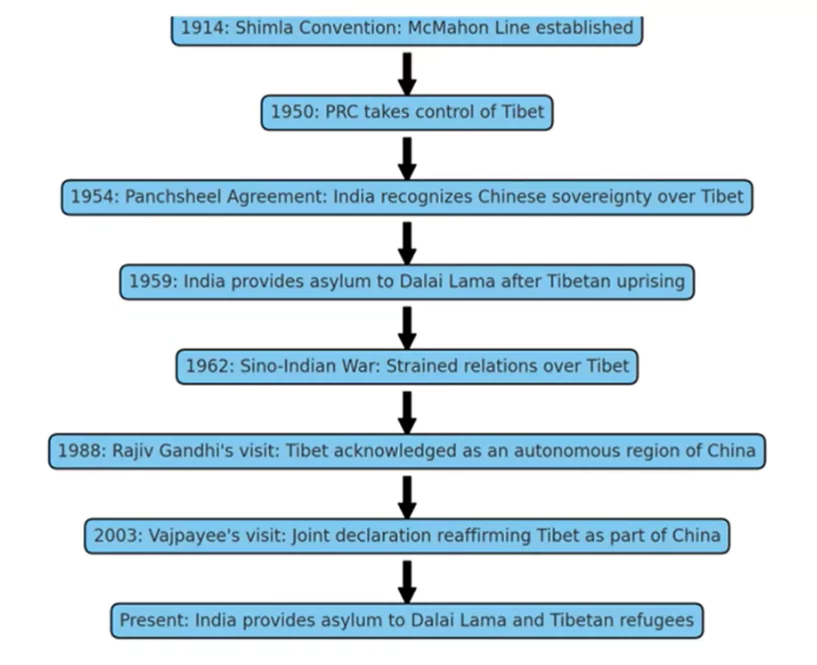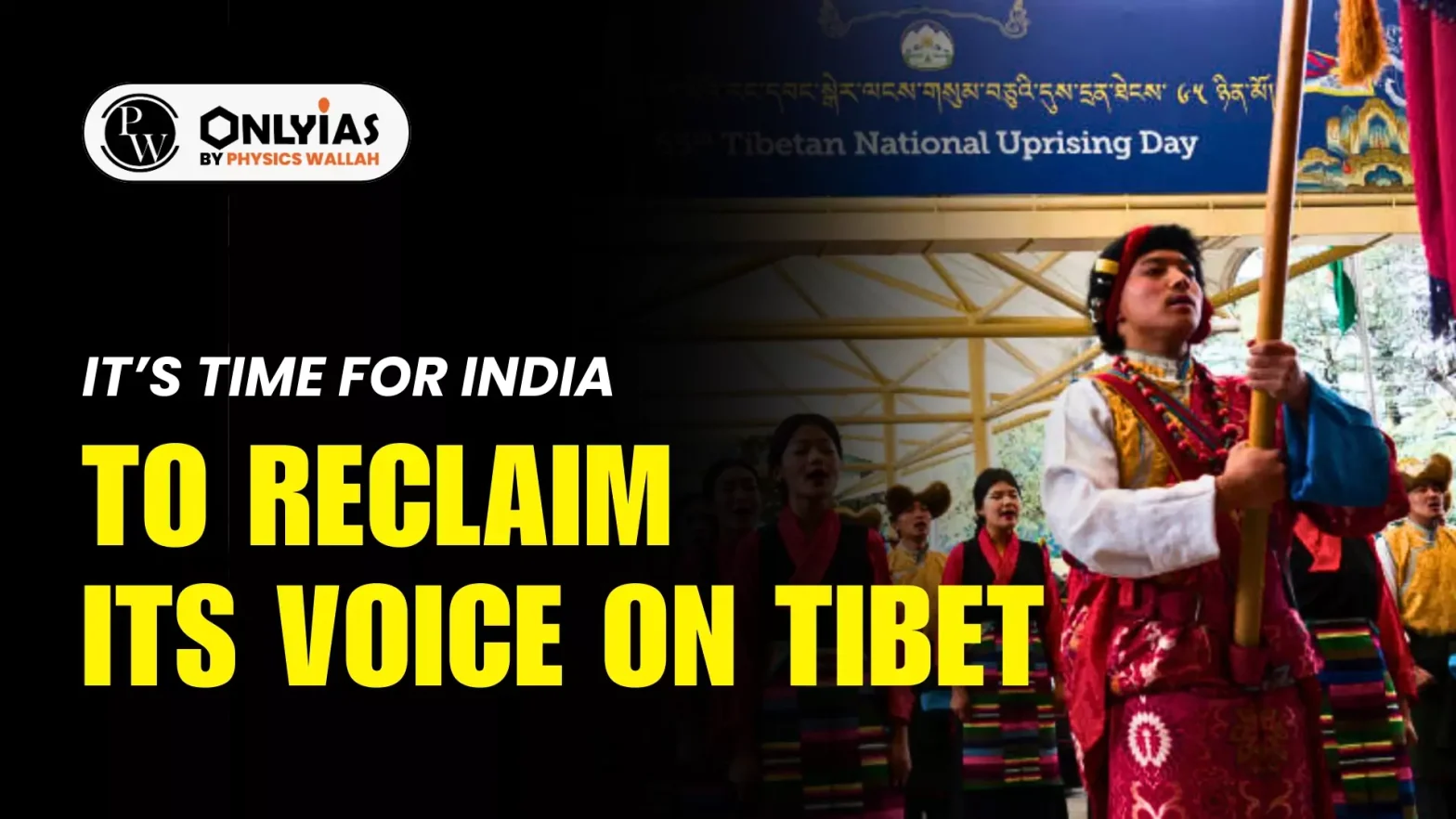The timing of the visit by a delegation of U.S. lawmakers to Dharamshala made it clear what it would be about.
| Relevancy for Prelims: Tibet-China Dispute Act, Dalai Lama, Line of Actual Control, etc.
Relevancy for Mains: India’s policy on Tibet, India’s evolving stance on the Tibet issue, etc. |
Time For India To Reclaim Its Voice On Tibet
- The delegation arrived just days after the passage of the ‘Promoting a Resolution to the Tibet-China Dispute Act’ in both Houses of U.S. Congress, which now awaits U.S. President Joe Biden’s signature.
 Both Democrat and Republican co-authors of the Bill were part of the delegation, invited by the Central Tibetan Administration that manages affairs of the Tibetan diaspora-inexile worldwide, for a special facilitation.
Both Democrat and Republican co-authors of the Bill were part of the delegation, invited by the Central Tibetan Administration that manages affairs of the Tibetan diaspora-inexile worldwide, for a special facilitation.- Given the circumstances, New Delhi would have been more than aware of the content of the speeches they would make, slamming China for its repression of the Tibetan people, calling for talks between the Dalai Lama’s representatives and Beijing that were suspended in 2010 to be restarted, and for a Free Tibet.
- “This bill is a message to the Chinese government that we have clarity in our thinking on this issue, for the freedom of Tibet,” said former House Speaker Nancy Pelosi.
- “[The Dalai Lama’s] legacy will live forever, but you, the President of China, will be gone, and no one will give you credit for anything.”
Enroll now for UPSC Online Classes
Weakness, not Strength
- While the sharp tone of these comments and even the presence of U.S. officials and lawmakers in Dharamshala is not new, this is the first time in recent years that a public rally of this kind has been held in India.
- India’s External Affairs Minister hosted the delegation for a late dinner the same evening as the rally, and the Prime Minister met them the next day, indicating that this was a more considered decision by New Delhi.
- Some people have even interpreted it as a strong message from New Delhi to Beijing amidst continuing tensions between the two countries, as a resolution to the Line of Actual Control military stand-off eludes them since the deadly 2020
- However, New Delhi’s decision to allow American politicians to take centre stage amongst the Tibetan refugee population in India in order to promote a U.S. law and pitch U.S. policy is not a show of strength, but could convey weakness.
- It also denotes the danger of letting a carefully calibrated foreign policy narrative on Tibet spin out of its control.
- To begin with, India has not joined the U.S. in publicly articulating its concerns on the treatment of Tibetans simply because its actions since 1959, of offering the Dalai Lama refuge and allowing Tibetan refugees to settle in India, speak much louder.
- To this day, people from Tibet trek across the Himalayas to seek refuge in India.
- Often, parents send just their children over, fearing for their future as Tibetan curriculum gets more standardised to the mainland’s system, rigorously enforced by the Chinese Communist Party.
- Given India’s own sensitivities on sovereignty and territorial integrity, New Delhi has worked out its own formulation on the Tibet issue and ties with China.
- It has “recognised” the Tibet Autonomous Region (TAR) as part of the territory of the People’s Republic of China since 1954.
- Since 2010, however, given China’s refusal to respect India’s territorial integrity, its renaming of places in Arunachal Pradesh, and its issuance of stapled visas to residents of Jammu and Kashmir, India stopped articulating a ‘One China’ policy or making references to Tibet in official statements.
- It contends that the Dalai Lama is a revered spiritual leader, despite China’s protests that he is a “separatist” or “splittist”.
- India also does not officially recognise the Tibetan Government in Exile or Parliament in Exile as more than organising mechanisms for the Tibetan people based here and abroad.
- Even though Prime Minister Narendra Modi invited the Tibetan Sikyong(elected leader) to his swearing-in ceremony in 2014, he did not do so in 2019 or this month.
- In 2018, a government circular reminded officials of India’s policy, asking them not to attend events commemorating the 60th year since the Dalai Lama’s flight to India.
- New Delhi has become more sensitive on such issues, as is evident from its objections to U.S. Ambassadors visiting Pakistan-occupied Kashmir, or to the space given for political or extremist Khalistani separatist rallies and referendums in the U.S., U.K., Canada, and Australia.
Moving Out of the Picture
- If the government wishes to change its line to mirror the more strident position on Tibet adopted by the U.S., then Indian officials and leaders should have made the statements that were addressed instead by U.S. lawmakers to Tibetans in Dharamshala, who were all waving U.S. flags (Indian flags were far fewer).
- The superfluousness of allowing the U.S. delegation to do so is underlined by the fact that the Dalai Lama travelled to the U.S. for medical treatment just days after their visit, and all the U.S. lawmakers could have met him in Washington DC instead.
- Above all, the problem with allowing U.S. leaders to aim messages at Beijing from a pulpit in India, and then have Beijing respond to those directly, is that India is getting cut out of a picture where it has been the most important external figure.
- This is not unlike its predicament in other parts of South Asia, including the Maldives, Sri Lanka, Nepal, and the Indian Ocean islands where its space is being diminished by growing U.S.-China contestations.
- With the U.S. giving the Karmapa a home and accepting more Tibetan refugees on the one hand, and China’s ever-tightening control of Tibetan Buddhist monasteries in the TAR on the other, India must consider the future of its own policy, especially with regard to the question of the Dalai Lama’s succession.
- New Delhi must move more decidedly to reclaim its own voice and the pace of its own policy narrative without being “bigfooted” by others.
Check Out UPSC NCERT Textbooks From PW Store
Conclusion
India must reclaim its voice on Tibet, balancing diplomatic relations with China while asserting its own policy narrative and avoiding undue influence from external powers.
![]() 28 Jun 2024
28 Jun 2024

 Both Democrat and Republican co-authors of the Bill were part of the delegation, invited by the Central Tibetan Administration that manages affairs of the Tibetan diaspora-inexile worldwide, for a special facilitation.
Both Democrat and Republican co-authors of the Bill were part of the delegation, invited by the Central Tibetan Administration that manages affairs of the Tibetan diaspora-inexile worldwide, for a special facilitation.